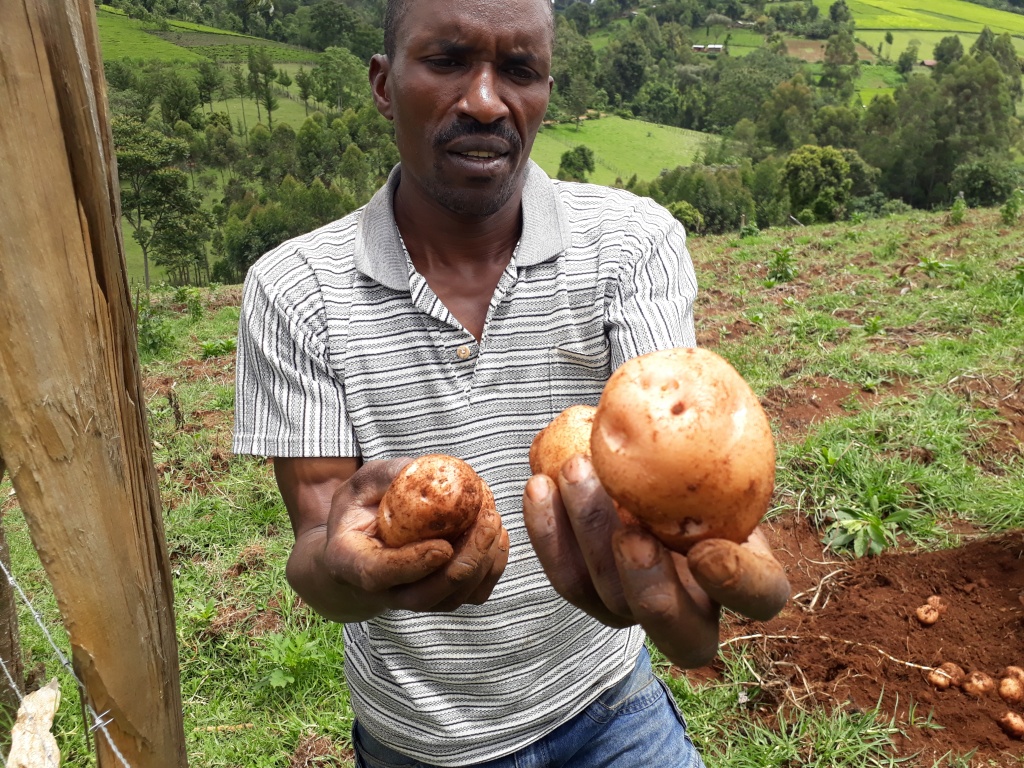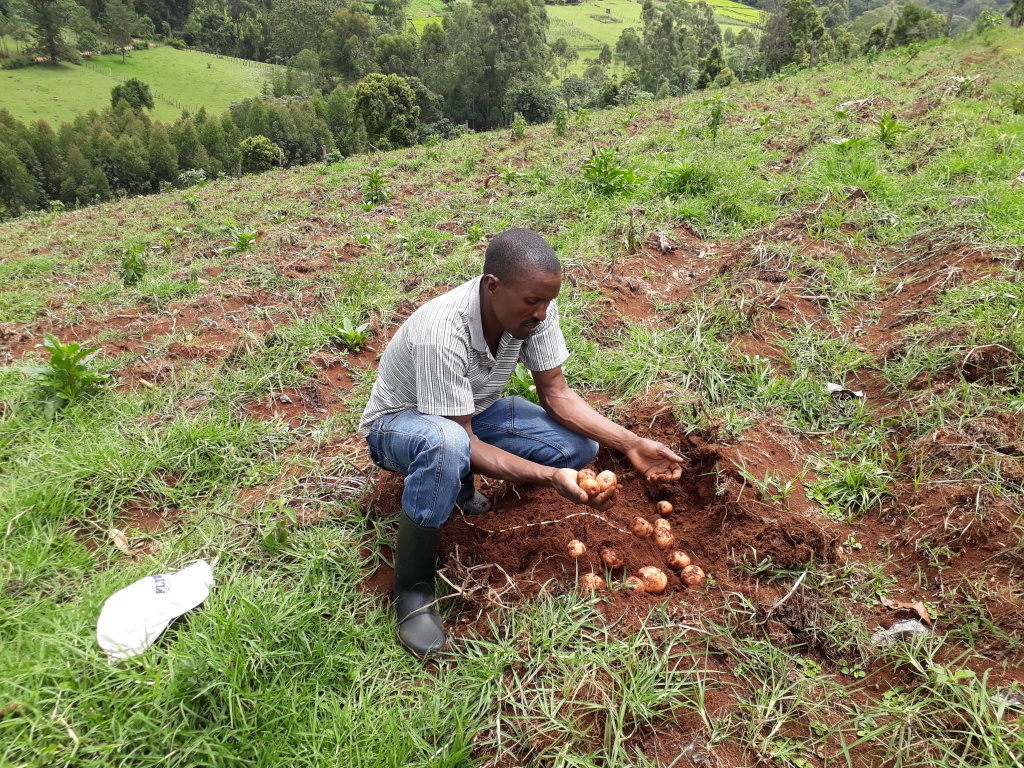
Bomet Potato farmer.
In the quest to quench the thirst of shortage of quality potato seed in Bomet County, the USAID funded Kenya Agricultural Value Chains Enterprises Project working with Deepa Industries, the processors of Tropical Heat brand of crisps approached Midlands Sacco to interest its members to venture into seed multiplication in 2015.
Elisha Lang’at, a 35 year-old farmer attended a training session and took interest in the business. Bomet is a key potato growing county, the preferred source by processors. Production is however hampered by shortage of good quality seed potato.
RELATED ARTICLE: Collective bargaining helps farmers’ cooperative earn 2bn from potato farming
For this reason, Elisha Langa’t developed interest in multiplying seed to tap the opportunity to make some money. After the training he took a soil sample and the results turned positive for potato without having to do much since his land was still virgin.
He bought three 50kg bags of starter seed from the Agricultural Development Corporation and planted them on .03 acres. After following all instructions as directed by the local agriculture extension officer he harvested 10 bags from each seed bag, giving himself 30 90kg bags of seed. He sold them and earned Sh 25,000.
Encouraged by the demand and good earnings, he has since expanded to two acres where he is expecting to reap 80 bags. He has no intention of growing ware potatoes but fully concentrate on seed multiplication. As he waits for rains to subside to start harvesting, his seed has already been booked by farmers.
He has subdivided his farm into blocks to enable crop rotation to avoid soil overuse and build-up of diseases.
KAVES, that is implementing some of USAID’s food security support programmes under the Feed The Future initiative, ventured into potato to increase productivity and income for smallholders as part of its target of assisting about 500,000 farmers to improve productivity and incomes across selected agricultural value chains in five years.
RELATED ARTICLE: Potato value addition earns Nyeri farmers sh10000 daily
“We picked the potato from our value chains studies which indicate the tuber is big from the beginning to the end of the chain and positioned as food security crop number two in Kenya after maize and mainly grown by smallholders”, said Kaves Chief of Party Dr Steve New at a conference in Bomet mid last month.
Kenya is dependent on maize which has been attacked by various pests and diseases threatening the country's food security. An attack by Maize Lethal Necrosis disease and lately army worms forced a shift to alternatives and potatoes were a natural choice for Bomet as well as other counties in the North Rift region.
A cost benefit analysis shows there is money to be made in potato farming. However, the potato value chain is encumbered in problems from start to finish. Studies show that seed, storage, agronomy, market systems, consumption and everything else about potato is loaded with challenges amidst a huge potential to create a robust sector like it is in Europe where they eat potatoes all the time either as roast, boiled, fried and more.
RELATED ARTICLE: Potato cyst nematode pest can reduce up to 80% potato production in Kenya
A lot has been done towards sorting these problems to increase productivity, the most notable being availability of a wider selection of varieties but the industry woes are still far. Top hotels are still importing frozen chips due to lack of suitable varieties with the right texture, shape and taste, said Dr New.
Marketing systems are still disorganized leading to disparities between farm and markets prices. Farmers are on the tail end of the bargain as brokers dictate the farm gate prices.
Storage remains a nightmare in the potato value chain creating an immediate need for county governments to build coolers for farmers to use for storage and marketing. "We cannot have a potato industry without refrigeration. You get best prices six months after harvesting and for this to be achieved farmers need technologies like small tractors for efficiency”, he added.
RELATED ARTICLE: Some 23,000 potato farmers to access markets
According to the Agriculture Sector Development Support Programme - Coordinator in Bomet, Evelyne Mwangangi,a value chain approach analysis in the potato sector unearthed major challenges from inputs supply to exit (markets). "Clean seeds supply is a challenge because producers are doing one variety here - the Dutch Robin being the preferred type by processors.

Bomet Potato farmer.
Over the past two years the seed supply has been erratic. The County government has been trying to assist by bulking but it hasn't helped much. "We reached a few farmers", said Mrs Mwangangi adding that due to the declining productivity, processors are going to Narok County denying Bomet farmers the much needed income.
The potato woes in Bomet are exacerbated by poor post harvest handling leading to high losses due to reliance on rainfed production. "When rains are good harvests are good and the opposite obtains if the trend is in the reverse. During glut farmers don't sell due to poor market links. Brokers take advantage and buy the produce at throwaway prices since farmers have to sell to avoid losing the harvest.
RELATED ARTICLE: KEPHIS introduces 52 new disease resistant potato varieties
According to Dr New, this can be addressed by establishment of cold storage facilities where farmers can store potatoes for longer enabling controlled selling. The facilities would also ease buyers’ pain and costs of having to move from farm to farm collecting potatoes.
To mitigate against seasonal production the government of Bomet is building a mega dam to supply irrigation water and enable year-round production.
Mrs Mwangangi has urged the development partners in Bomet to work together to solve the challenges instead of duplicating efforts with reduced impact.
The National Potato Council of Kenya has compiled a catalogue of potato varieties available in the country and a list of dealers to enable farmers access information on where to purchase what seeds.
Among the seed producers are - Kisima, Karlo, ADC, Syngenta, Suera, Agreco, GTIL, Leah Rono, Gen-Biotech, Grace Rono, Singus Enterprises and Julius Kandie. Farmers can also get clean tubers from Kimingi Farm, Narok.
Failure to enforce the 2013 packaging at 50kg/bag law to eradicate the extended bags malpractice has continued hampering profitability and quality of potatoes. According to the Kenya National Potato Producers Association, only Meru County has succeeded in this endeavor, an indication that other growing regions could succeed if they committed to kick out the exploitative method.
















Comments powered by CComment